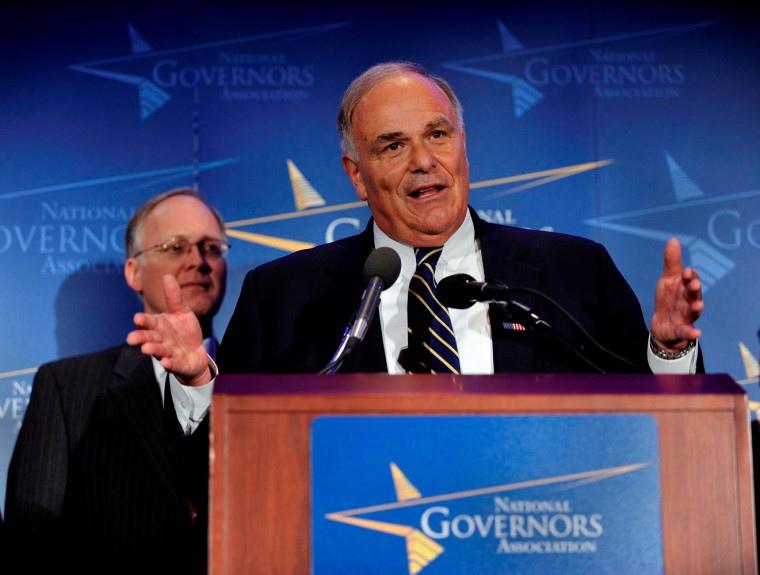Governors said Saturday they welcomed the money flowing to states from President Obama's landmark stimulus plan and played down disagreements among some Republicans in their ranks about how the dollars should be spent.
At the opening news conference of the National Governors Association winter meeting, NGA Chairman Ed Rendell of Pennsylvania, a Democrat, acknowledged that the $787 billion plan Obama signed into law this week "isn't a perfect bill." But he said the billions directed to states for health care, education and road repair would help governors mitigate a potential economic disaster in their states.
"It stops us from having massive layoffs and incredible reduction in services that would have exposed our citizens to tremendous personal risks," Rendell said.
Vermont Republican Gov. Jim Douglas, the NGA vice chairman, largely echoed that view. "I believe every governor should and will exercise due diligence to make sure that the acceptance of any federal resources is in the best interest of that state and its residents," Douglas said.
Their comments addressed dissent among a handful of GOP governors led by South Carolina's Mark Sanford, who have publicly criticized the stimulus plan as too big and wasteful. Louisiana Gov. Bobby Jindal announced Friday he would reject a portion of the money aimed at expanding state unemployment coverage, and Mississippi Gov. Haley Barbour has indicated he may do so as well.
"I will oppose my state changing our rule to allow people who are not willing and able to work full-time to get unemployment compensation. That will result in tax increases on our employers going forward," Barbour said.
Both Sanford and Jindal are considered likely 2012 presidential contenders. Florida Gov. Charlie Crist, another Republican thought to be eyeing a 2012 presidential bid, has been a strong supporter of the stimulus and appeared with Obama at a rally earlier this month to promote the plan.
Montana Gov. Brian Schweitzer, the chairman of the Democratic Governors Association, dismissed GOP concerns about the plan as inconsistent with their willingness to accept federal money in other cases.
"It does seem out of character for a governor who has been receiving billions of dollars for years to suddenly say 'I'm not so sure I want these dollars,'" he said, noting that a provision in the law would allow state legislatures to accept the stimulus money even if a governor rejects it.
Asked if he thought Republicans had a political motive in criticizing the plan, Schweitzer said, "I don't think we ought to question anyone's motives."
The three-day meeting in Washington was to focus on states' need to rebuild and repair infrastructure. Most state leaders were expected to attend the nonpartisan gathering, but a few of the better-know governors were absent.
Among them are Bill Richardson, the New Mexico Democrat who was Obama's first choice to head the Commerce Department and now faces a federal "pay to play" probe, and Alaska's Sarah Palin, the 2008 Republican vice presidential nominee, who is busy with her state's legislative session.
Among Democrats, much attention was on Kansas Gov. Kathleen Sebelius, who has emerged as a potential contender to be health secretary in Obama's Cabinet. Former Senate Majority Leader Tom Daschle withdrew his nomination after admitting he had not paid all his taxes since leaving Congress.
Candidates in this year's gubernatorial contests were expected to be on hand.
In Virginia, former Attorney General Bob McDonnell, a Republican, hopes to capture the seat being vacated by Democrat Tim Kaine. Three Democrats are competing in the state's June primary: former state delegate Brian Moran, state Sen. Creigh Deeds and Terry McAuliffe, the former chairman of the Democratic National Committee.
In New Jersey, Democratic Gov. Jon S. Corzine was expected to face a robust GOP challenge, probably from former U.S. Attorney Chris Christie.
The president and first lady Michelle Obama were hosting a black-tie dinner for the group Sunday, and governors were expected to return to the White House Monday for a policy briefing.
